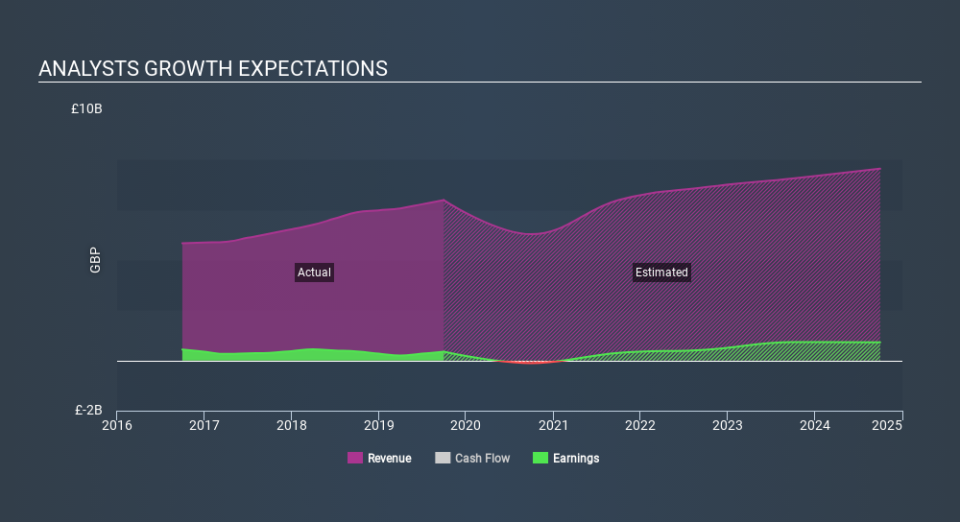Time To Worry? Analysts Just Downgraded Their easyJet plc (LON:EZJ) Outlook

The latest analyst coverage could presage a bad day for easyJet plc (LON:EZJ), with the analysts making across-the-board cuts to their statutory estimates that might leave shareholders a little shell-shocked. Both revenue and earnings per share (EPS) estimates were cut sharply as analysts factored in the latest outlook for the business, concluding that they were too optimistic previously. Bidders are definitely seeing a different story, with the stock price of UK£6.81 reflecting a 37% rise in the past week. It will be interesting to see if the downgrade has an impact on buying demand for the company's shares.
Following the latest downgrade, the 22 analysts covering easyJet provided consensus estimates of UK£5.0b revenue in 2020, which would reflect a sizeable 21% decline on its sales over the past 12 months. Following this this downgrade, earnings are now expected to tip over into loss-making territory, with the analysts forecasting losses of UK£0.39 per share in 2020. Previously, the analysts had been modelling revenues of UK£5.6b and earnings per share (EPS) of UK£0.015 in 2020. the analysts have made an abrupt about-face on easyJet, administering a modest decline in to revenue forecasts and slashing earnings forecasts from profit to loss.
View our latest analysis for easyJet
The consensus price target fell 10% to UK£10.35, with the analysts clearly concerned about the company following the weaker revenue and earnings outlook. That's not the only conclusion we can draw from this data however, as some investors also like to consider the spread in estimates when evaluating analyst price targets. Currently, the most bullish analyst values easyJet at UK£18.00 per share, while the most bearish prices it at UK£4.50. As you can see the range of estimates is wide, with the lowest valuation coming in at less than half the most bullish estimate, suggesting there are some strongly diverging views on how think this business will perform. As a result it might not be possible to derive much meaning from the consensus price target, which is after all just an average of this wide range of estimates.
Of course, another way to look at these forecasts is to place them into context against the industry itself. These estimates imply that sales are expected to slow, with a forecast revenue decline of 21%, a significant reduction from annual growth of 7.3% over the last five years. By contrast, our data suggests that other companies (with analyst coverage) in the same industry are forecast to see their revenue grow 5.7% annually for the foreseeable future. It's pretty clear that easyJet's revenues are expected to perform substantially worse than the wider industry.
The Bottom Line
The biggest low-light for us was that the forecasts for easyJet dropped from profits to a loss this year. Unfortunately analysts also downgraded their revenue estimates, and industry data suggests that easyJet's revenues are expected to grow slower than the wider market. After such a stark change in sentiment from analysts, we'd understand if readers now felt a bit wary of easyJet.
Unfortunately, the earnings downgrade - if accurate - may also place pressure on easyJet'smountain of debt, which could lead to some belt tightening for shareholders. To see more of our financial analysis, you can click through to our free platform to learn more about its balance sheet and specific concerns we've identified.
You can also see our analysis of easyJet's Board and CEO remuneration and experience, and whether company insiders have been buying stock.
If you spot an error that warrants correction, please contact the editor at editorial-team@simplywallst.com. This article by Simply Wall St is general in nature. It does not constitute a recommendation to buy or sell any stock, and does not take account of your objectives, or your financial situation. Simply Wall St has no position in the stocks mentioned.
We aim to bring you long-term focused research analysis driven by fundamental data. Note that our analysis may not factor in the latest price-sensitive company announcements or qualitative material. Thank you for reading.

 Yahoo News
Yahoo News 
